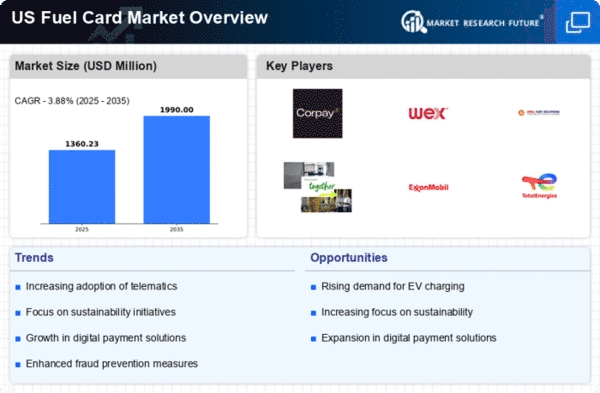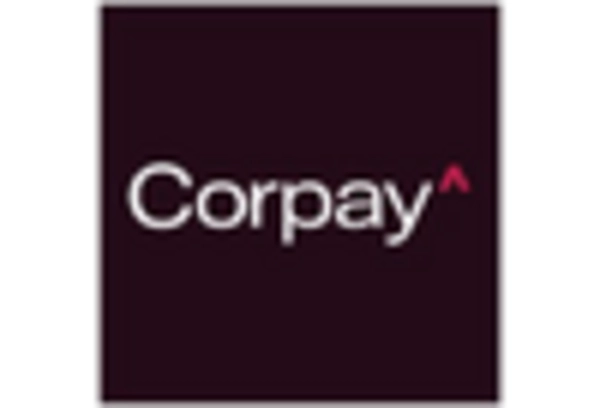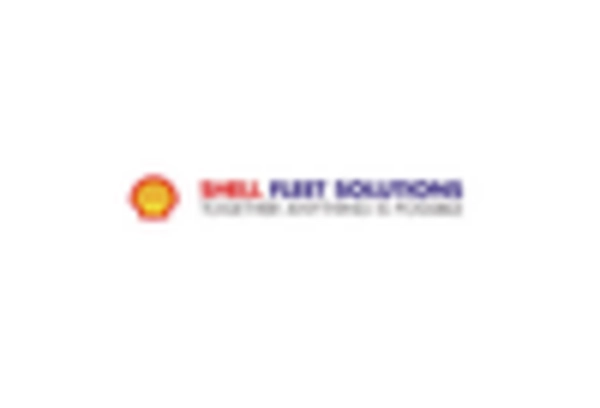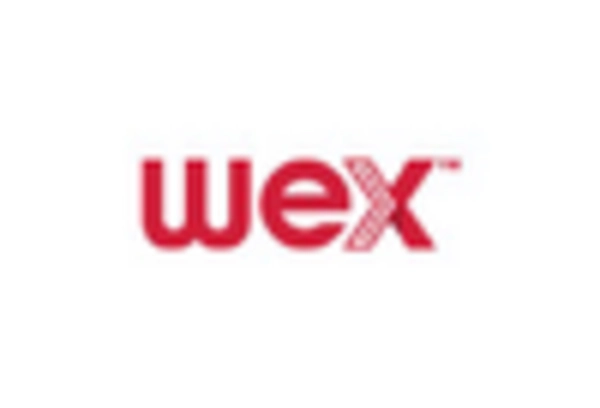Rising Fuel Prices
The fuel card market is experiencing a notable impact from the rising fuel prices in the US. As fuel costs continue to escalate, businesses are increasingly seeking ways to manage their fuel expenditures effectively. Fuel cards provide a mechanism for companies to monitor fuel consumption and control spending, which is particularly crucial in an environment where fuel prices can fluctuate significantly. In 2025, the average price of gasoline in the US is projected to be around $3.50 per gallon, prompting companies to adopt fuel cards to gain insights into their fuel usage patterns. This trend indicates a growing reliance on fuel card solutions as organizations strive to optimize their fuel budgets and enhance operational efficiency within the fuel card market.
Increased Competition
Increased competition among fuel card providers is reshaping the landscape of the fuel card market. As more companies enter the market, there is a growing emphasis on offering innovative features and competitive pricing to attract customers. In 2025, it is estimated that the number of fuel card providers in the US will increase by 20%, leading to a wider array of options for businesses. This competitive environment encourages providers to enhance their service offerings, such as loyalty programs and discounts, which can significantly benefit end-users. Additionally, the rise of niche players focusing on specific industries may lead to tailored solutions that better meet the unique needs of various sectors. This trend indicates a dynamic shift within the fuel card market, as businesses are presented with more choices and opportunities to optimize their fuel management strategies.
Regulatory Compliance
Regulatory compliance is becoming increasingly critical for businesses operating in the fuel card market. The US government has implemented various regulations aimed at promoting transparency and accountability in fuel transactions. Companies are required to maintain accurate records of fuel purchases and usage, which can be efficiently managed through fuel card systems. In 2025, it is anticipated that compliance-related costs for businesses will rise by approximately 15%, driving the demand for fuel cards that facilitate adherence to these regulations. By utilizing fuel cards, organizations can streamline their reporting processes and ensure compliance with federal and state regulations, thereby mitigating potential penalties. This trend underscores the importance of regulatory compliance in the fuel card market, as businesses seek to avoid legal complications and enhance operational integrity.
Technological Advancements
Technological advancements are playing a pivotal role in shaping the fuel card market. The integration of mobile applications and telematics systems allows businesses to track fuel usage in real-time, providing valuable data for decision-making. In 2025, it is estimated that over 60% of fuel card users in the US will utilize mobile platforms for managing their fuel transactions. This shift towards technology-driven solutions enhances the user experience and streamlines operations, making fuel cards more appealing to fleet managers. Furthermore, the incorporation of advanced analytics into fuel card systems enables companies to identify trends and optimize routes, thereby reducing fuel consumption. As technology continues to evolve, the fuel card market is likely to witness increased adoption of innovative solutions that enhance efficiency and reduce costs.
Fleet Management Optimization
The need for fleet management optimization is a significant driver in the fuel card market. As companies strive to enhance their operational efficiency, the integration of fuel cards into fleet management systems has become increasingly prevalent. In 2025, it is projected that around 70% of fleet operators in the US will utilize fuel cards to monitor fuel consumption and vehicle performance. This integration allows for better tracking of fuel expenses and identification of inefficiencies within fleet operations. By leveraging fuel card data, businesses can make informed decisions regarding route planning and vehicle maintenance, ultimately leading to reduced fuel costs. The emphasis on fleet management optimization highlights the growing reliance on fuel card solutions within the fuel card market, as organizations seek to maximize their resources and improve profitability.
















